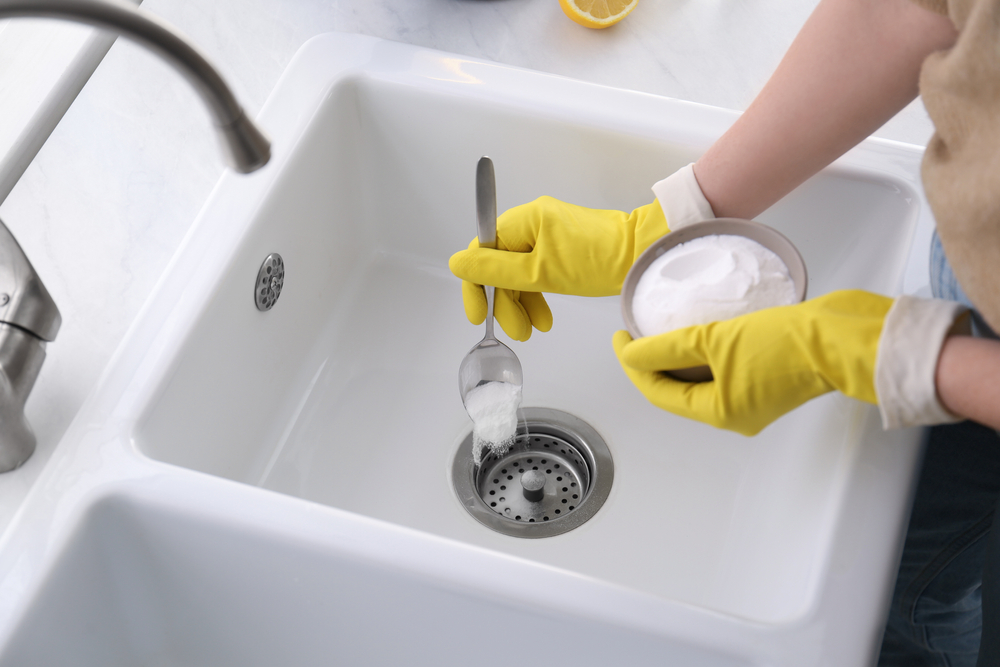Your septic tank is an underground holding tank that collects all wastewater from your home. There is a pipe at the top of the tank that drains the wastewater into a drainfield in your yard when the septic tank gets full.
If the pipe leading to the drainfield becomes clogged, the septic tank will fill up and eventually the wastewater will back up into your home.
This is an issue you don’t want to deal with. The damage to your home can be extensive – this is why it’s important to troubleshoot a clogged septic line before it becomes an expensive issue.
However, before you can determine if you are dealing with a clogged septic line, it’s helpful to first understand whether it is a clogged drain or a clogged septic line.
Is It a Clogged Drain or a Clogged Septic Line?
There are many instances where clogged drains and slow drains can be resolved by simply clearing the plumbing backup inside your home.
Slow and clogged drains commonly occur in the drain-waste-vent system because this system is used frequently throughout the day. They can also be caused by foreign objects and substances accumulating in your pipes.
In order to address any sort of clog, it’s important to correctly identify where the issue is occurring. If the issue is not occurring inside of your home, the steps to fix it are vastly different than merely clearing out the offensive clog.
As we mentioned above, your septic system is not a singular element and involves the tank, waste pipes, and the drainfield.
Here are some of the symptoms of a septic line clog that are similar to a clogged drain:
Clogged Baffle
A septic tank typically has an inlet baffle and an outlet baffle. The inlet baffle allows the wastewater to enter the tank while the outlet baffle prevents solids from traveling into the drainfield.
A clog in either baffle prevents wastewater from properly draining and can slow or stop drains.
However, unlike a clogged drain, this can not be fixed with a chemical cleaner. This type of clog must be corrected by a professional sewer technician.
Pipe Damage
It’s not only the lines to the drainfield that can become clogged – the pipe leading from your home to the septic system can run into problems as well.
This is known as the main sewer line and is susceptible to clogs and external damage such as tree root invasion, pressure from large equipment, and even earthquakes.
If your home has an older system, it’s likely that the pipes are made out of clay. Clay piping is extremely brittle and more susceptible to damage.
Drainfield Failure
Septic systems have a limited lifespan and your drainfield is only expected to last for a couple of decades before a new one has to be installed in a different location on your property.
Otherwise, drainfields can fail in a number of ways such as when too much solid waste clogs the lines. At this point, it’s likely that the lines need to be replaced since it not only causes a clogged septic line but also damages the drainage capacity of the soil.
Another way in which your drainfield can fail is due to compaction. This occurs if you frequently walk, drive, or park on it or cover it with concrete or a structure. The force can crush the pipes and compress the air out of the drainfield.
Overall, a failing drainfield reduces the ability of your septic system to process wastewater which can eventually slow or block drains similar to a clog.
DIY Repairs for Clogged Septic Lines
Once you troubleshoot a clogged septic line, how can it be repaired? A septic line clog should be fixed by a professional sewage company and not by someone with minimal training and a lack of tools.
However, it is possible to fix it on your own if the clog is in the pipes. Sprinkle baking soda down the drain and follow with white vinegar. Let the mixture sit for an hour or two before flushing the drain with hot water.
You can also use an auger for substantial clogs by pushing the cable into the pipe.
If you can’t clear the clog using either of these methods, the issue resides in your septic system. At this point, it’s time to call in the professionals.
Calling in the Professionals
We all love DIYing our own repairs to save time and money but when it comes to your septic system, you could do more harm than good.
The use of chemical drain cleaners to clear blockages can kill the bacteria in your septic tank. This bacteria is necessary for breaking down waste and, without them, your septic lines could become clogged.
Professional sewer technicians use safe, eco-friendly solutions to clear out clogged lines – this saves you time and helps you avoid costly repairs.
Sewer technicians can also resolve clogged septic lines quickly before damage occurs due to pressure build-ups in your pipes.
These professionals will also examine the inside of your pipes with a sewer inspection camera to locate and address the issue. Not only will this help isolate the location of the clog but they can also discover any other problems, such as cracks and leaks, before they cause serious damage.
Preventing Clogged Septic Lines
Apart from troubleshooting and repair a clogged septic line, you can also take steps to prevent the line from getting clogged in the first place.
First, only toilet paper should be flushed down your toilet. Paper towels, wet wipes, and feminine hygiene products put your septic line at a higher risk of clogging.
These products also won’t dissolve properly in your septic tank and accumulate at the bottom which can lead to having your entire system pumped out.
Second, disposing of grease down your sink drain may seem like the easiest solution but as that liquid travels down your drains, it solidifies and gets sticky and hard.
It will cling to the sides of your pipes and septic lines, catching other debris that floats by and causing a clog to form. It will also accumulate in your septic tank and float to the top, causing it to spill into the drainfield and cause expensive clogs and damage.
Leave the Guesswork to the Professionals!
If ever you have a clogged drain in your home, have a professional sewer technician inspect the issue to determine the cause.
Our team at Peak Sewer is available 24-7 to address all of your plumbing needs!
Don’t let clogs and slow drains become bigger and more expensive problems. Get in touch with us today!


